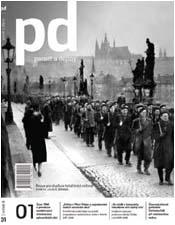Únor 1948 a perzekuce zaměstnanců ministerstva zahraničních věcí
February 1948 and the persecution of ministry of foreign affairs employees
Author(s): Ivana Koutská Subject(s): History
Published by: Ústav pro studium totalitních režimů
Summary/Abstract: Although the Communist Party strove to seize power over the Ministry of Foreign Affairs (MZV) in 1945–48, they failed due to the unquestionable credit of Czechoslovak diplomacy in the effort to renew the Republic during World War Two. The employees of the foreign representations, however, were under the control of the Intelligence Department of the Ministry of the Interior from 1945, led by the communists. The unit of the Czechoslovak Communist Party in the MZV was founded by V. Hajdu in 1945 and it had 60–70 members during the February coup. As of 1 January 1948, MZV had 1256 employees, of this, 602 of whom where employed as of 31/12/1938. The February coup actually resulted in the transformation of the Ministry following the Soviet example – 70–80% of the staff of foreign representations was to consist of foreign intelligence officers. This conversion to a residency of the Soviet intelligence service could not be achieved with the existing staff nor with Minister Jan Masaryk. After his as yet unexplained death on 10 March 1948, the communist Vlado Clementis became his successor, already in the Ministry from 1945 as a State Secretary, and put the planned transformation into practice. The changes were accompanied by a power struggle inside the Party unit. Some of the coup organisers were removed from the Ministry, in line with the practice usual in the Soviet totalitarian system, and V. Clementis was sentenced to death and executed as part of the trial with Rudolf Slansky. The post-February “purge” was conducted by the Action Committee of the National Front (Akcni vybor Narodni fronty), which also included the representatives of non-communist parties; however, personal affairs were actually decided on by a committee of “leading comrades from the MZV” (V. Borek, G. Sekaninova, V. Bures, V. Hajdu, A. Tauber and V. Cerny) which held meetings at the Central Committee of the Communist Party with Bedrich Geminder. From the latter half of 1948, someone being designated as a politically unreliable person or as so-called “former people” sufficed for the MZV to have them persecuted. Changes in the law, adopted in 1948–1950, especially Act 231/1948 of 6 October 1948, allowed anyone to be punished for anything. In the chaotic spirit of fear after February 1948, notices were despatched to employees following already prepared lists; they were forced out of their offices and removed from foreign representations. In protest against this injustice, foreign representation officials in democratic countries made mass resignations and fled illegally from Czechoslovakia. Initially so-called objective reasons were tried to be found for officers from their offices, such as retirement age or reorganisation.
Journal: Paměť a dějiny
- Issue Year: II/2008
- Issue No: 01
- Page Range: 39-52
- Page Count: 14
- Language: Czech

